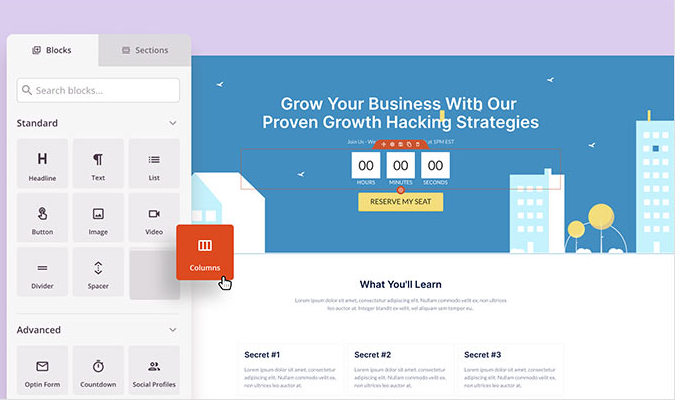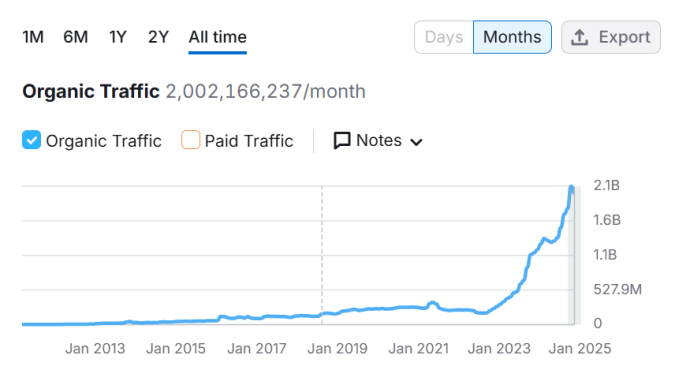Want to know the right cloud hosting provider for making the jump up from shared hosting? We used over 60 hours of our own research to give you the hard facts.
The Best Cloud Web Hosting Options to Consider:
- Hostinger – Best cloud hosting for WordPress
- Atlantic.Net — Best for compliance-ready cloud hosting
- Hosting.com– Lowest-cost cloud hosting for multiple sites
- InMotion Hosting – Most scalable cloud VPS hosting
- DreamCompute – Best for developers and virtual cloud computing
When It Makes Sense To Invest In Cloud Web Hosting
Knowing the differences between cloud hosting and shared hosting is the first step to figuring out whether it’s time for you to invest in a hosting upgrade.
We’re just going to talk about these two options in this section. But, if you’d like a nice overview of the entire category of web hosting, check out our full guide on the different types of hosting to learn about how they differ in greater detail.
Shared hosting makes you share server resources with other sites on the same server. It’s the cheapest option in most cases, but it often means that performance—that is, the speed at which your site loads and how rarely your host’s servers are down—suffers when someone else is using more resources than usual.
Basically, shared hosting has trouble whenever there are surges of traffic, whether that traffic is going to your website or another site being hosted on the same server. Because of that, you can’t ensure a perfect, reliable experience for site visitors. And, if your site is growing in popularity, your site might be sluggish or unavailable more often than it performs well.
Enter cloud hosting. This is usually the most affordable way to improve site load speeds and uptime reliability once you’ve had enough of the frustration that can come with shared hosting.
Cloud hosting splits up the resources your site has access to across multiple virtualized servers. Instead of your resources being drained if another site is experiencing a surge of visitors, your hosting provider just utilizes the resources of another server connected via the cloud.
And, if one fails, another is available to take its place. No one even notices there’s something wrong.
It also means that, with some hosts, you can scale up your access to servers’ memory, disk space, or processing power with a click or two. With cloud hosting, you can turn resources on and off like a faucet to compensate for fluctuating traffic.
The category of cloud hosting also allows access to some powerful and unique opportunities. Some providers offer cloud computing packages that let you spin up virtual machines or create multiple virtual private server (VPS) environments.
The main takeaway here is that cloud hosting removes a lot of the pain of traditional hosting if or when something goes wrong.
And this is why cloud hosting services are the most popular way to host high-traffic websites, news sites, ecommerce stores, interactive sites, forums, and online communities.
You can even run web applications, web-based SaaS platforms, and IoT device deployment and monitoring on cloud hosting because of the reliable uptime delivered by multiple servers backing up your data.
If you want this kind of reliability and flexibility or you’re looking for the best way to take an affordable step up from shared hosting, then cloud hosting is likely a smart investment for you.
#1 – Hostinger — Best cloud hosting for WordPress
Hostinger is best suited for users who want the ease of use of shared hosting but the boosted performance of cloud hosting. It’s perfect for anyone building a new website from scratch or migrating an existing site from shared hosting.
Simply put, if you want faster performance without a complex setup, Hostinger is for you. Part of what makes it so easy is Hostinger’s guided website setup process. It never leaves you guessing what to do next.
Our new account was ready to go immediately after completing signup, which was a great start. After logging in, a website setup wizard will automatically initiate that asks a few questions about the type of website you’re building, your experience level, and how much guidance you’d like.
This was much easier than the rest of the providers on the list. Hostinger tailors the setup process to your specific knowledge level and needs.
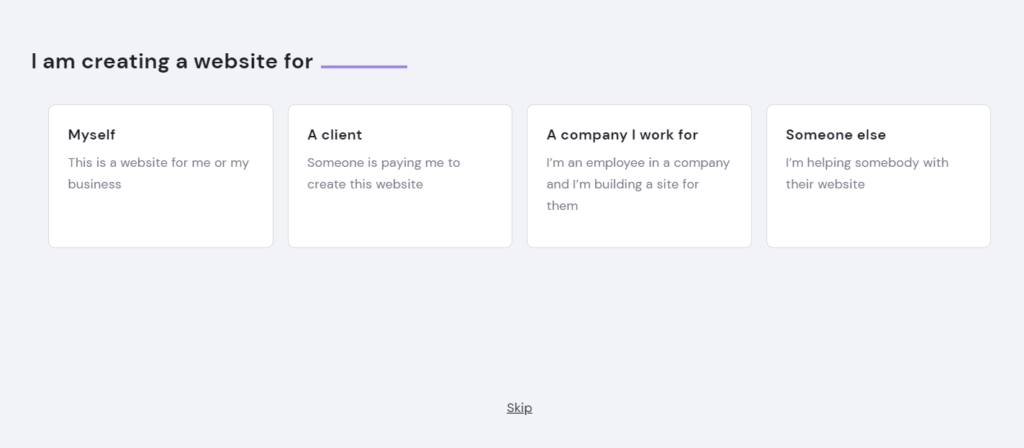
You’ll set up your domain name, choose the data center you want to use, and that’s it. The guided setup process keeps you on track. Then, after that, you can choose a site-building platform or use Hostinger’s proprietary (and easy to use) hPanel to migrate your existing site over.
It only took around five minutes to set up our WordPress site and get started with Hostinger. We can safely say that any user—even someone with no experience whatsoever—should have things up and running in under 20 minutes.
Best of all, Hostinger’s cloud offerings are fully managed. That means their team takes care of things on the backend to ensure that uptime stays consistent, your site performs well, and security vulnerabilities are eliminated. Plus, they’ll handle updating your WordPress site’s core and plugins and even save daily and weekly backups of your site data.
Hostinger eliminates the anxiety of managing your own server and lets you quickly deploy sites on their cloud hosting platform.
So, it’s friendly to users of all experience levels. But does Hostinger’s cloud hosting perform well?
In our speed tests, it was the fastest-loading host among the providers we reviewed. Our test site loaded in the blink of an eye for an entire month, with the exception of one day (and even then, it didn’t get worse than taking one full second to load). On average, Hostinger loaded our site in less than two-tenths of a second.
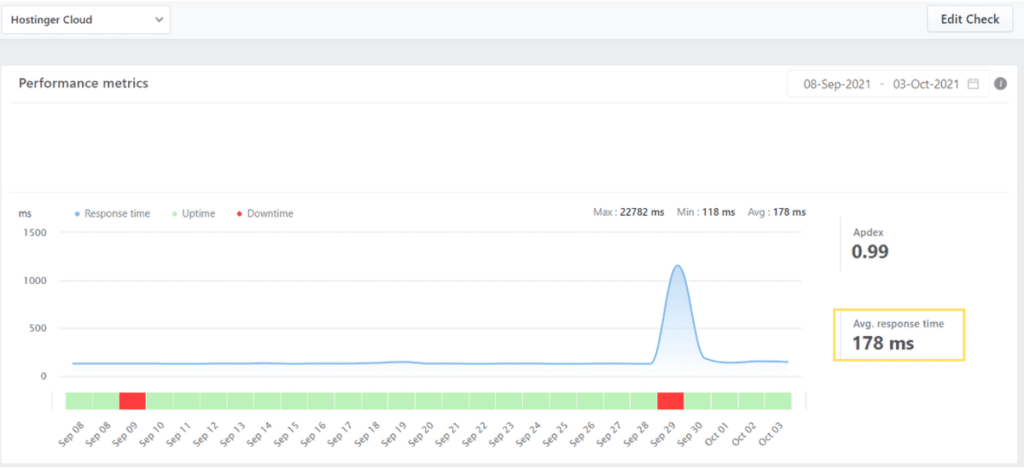
The average server response time across all the hosts we tested was 304 milliseconds. Hostinger averaged almost half of that.
And that’s a big step up over Hostinger’s shared hosting, which averaged load times of over half a second (670 milliseconds, to be exact) when we tested it.
The excellent performance is bolstered by some built-in features on Hostinger’s cloud hosting plans. Their custom cache manager keeps your site leaner and meaner, while WordPress sites further benefit from the included object cache, which can help them load three times faster.
Hostinger makes sure your visitors are not sitting around waiting for pages to load. They get on your site, find what they’re looking for, and are more likely to stay on your site.
What does this all cost you? Not much.
Hostinger’s entry-level cloud offering, Cloud Startup, lets you host up to 300 websites for $7.49 per month when you commit to the longest term. With it, you get 200 GB of NVMe storage, 3 GB of RAM, one free year of a custom domain, a free SSL, and more.
That’s a powerhouse of an upgrade for nearly the same price that Hostinger’s entry-level shared hosting plan renews at.
That being said, Cloud Startup renews at $25.99 per month after your initial term ends, whether you choose one, two, or three years at checkout. Just be mindful of the rate hike that will eventually come and, if you can afford it at sign up, consider opting for the longest term for your promotional pricing.
Need more than that? Cloud Professional adds 50 GB of storage (for 250 GB total) and doubles your RAM and CPU cores for more potent processing power. The next step up, Cloud Enterprise, does the same from Cloud Professional, resulting in a resource set of 300 GB of storage, 12 GB of RAM, and six CPU cores. Those plans start at $15.99 and $29.99 per month, respectively.
Want to go even deeper? Check out our post reviewing Hostinger’s full array of offerings.
Factoring in the speed and resources you get, as well as the affordable price point for managed cloud hosting, and there’s no better way to step up from shared hosting. Hostinger stands apart as our top pick.
#2 – Atlantic.Net — Best for Compliance-Ready Cloud Hosting With Hands-On Support
Atlantic.Net’s Cloud Platform is built for teams that have outgrown basic shared hosting and need reliable, scalable cloud infrastructure—especially in industries where security and compliance actually matter.
Instead of piecing together services from multiple vendors, you get cloud servers, secure block storage, private networking, backups, and managed services from the same provider. Everything runs on high-availability infrastructure with SSD storage, RAID-10 redundancy, and a 100% uptime guarantee on critical components, backed by 24/7/365 support from experienced engineers.

Atlantic.Net lets you deploy general-purpose, compute-optimized, memory-optimized, and storage-optimized instances so you can match resources to each workload—whether that’s a marketing site, busy ecommerce store, SaaS app, or internal line-of-business tool. You can manage everything through a straightforward control panel or API, and scale up resources as traffic climbs.
Security and compliance are also a core part of the platform. Atlantic.Net operates SOC 2 and SOC 3–audited data centers and offers HIPAA- and PCI-ready environments, plus managed firewalls, encrypted backups, VPN access, intrusion detection, and network edge protection if you need a fully hardened stack instead of DIY security.
Notable highlights of Atlantic.Net’s cloud platform include:
- Highly available cloud infrastructure: Redundant SSD storage, RAID-10 architecture, and a 100% uptime SLA on critical infrastructure for mission-critical sites and apps.
- Flexible cloud instances: General-purpose, compute-, memory-, and storage-optimized cloud servers so you can tune performance and cost for each project.
- Built-in security and networking: Private networking, secure block storage, backup and replication options, and the ability to add managed firewalls, VPNs, and IDS.
- Compliance-ready options: HIPAA-, HITECH-, and PCI-friendly configurations on top of SOC 2 and SOC 3–certified data centers for regulated workloads.
- Global data centers: Multiple regions across the U.S., Canada, the UK, and Singapore, so you can place workloads close to your customers.
- Hands-on managed services: If you don’t have an in-house ops team, Atlantic.Net can help design, deploy, and manage your cloud environment for you.

If you’re comparing cloud hosting options and care as much about compliance, uptime guarantees, and real human support as you do about raw specs, Atlantic.Net’s cloud platform deserves a spot on your shortlist.
#3 – Hosting.com — Lowest-Cost Cloud Hosting for Multiple Websites
Some people only need a cloud web host to support a single website. But, if you’re building an online empire, it’s ideal to find a provider that can support them all effectively on one hosting plan.
And it sure doesn’t hurt if that multi-site hosting plan doesn’t cost you an arm and a leg. That’s exactly what Hosting.com delivers.
Hosting.com’s cloud VPS plans give you a secure and scalable hosting environment that works for 10 sites or 100 on the same plan. That gives you the freedom to build multiple websites, park every alternative domain name on the same plan, or even use it to build out and support sites you create for clients.

Fortunately, Hosting.com’s unmanaged cloud VPS plans are also attractively priced. You can secure this type of hosting for as little as $4.99 per month, though the resources allotted might not be enough to host more than a couple full-fledged websites. Other plans of this type from Hosting.com scale up the memory, processing power, and storage space.
These options are good enough for a few websites and parking a bunch of alternative domains that can also point to them. But what if you’re building out client sites that all need to perform well, even when they’re laden with content, imagery, plugins, and more?
You have two options: turbocharge your unmanaged VPS plan by tapping into one of Hosting.com’s Supersonic plans or step up to their pricier but more powerful managed cloud VPS offerings.
The Supersonic plans can give you up to 16 GB of RAM, 300 GB of NVMe storage, eight CPU cores, and 6 TB of transfer bandwidth. That upper-echelon package will run you $59.99 per month. However, there’s a half-step that slightly reduces the resources but only costs you $29.99 per month.
Now, the main issue for some folks will be the unmanaged nature of those plans. That leaves all the server administration, including backups, security monitoring, and software updates, on you, the end user.
If you want to remove that stressor from your life, you can opt for one of Hosting.com’s managed cloud VPS plans.
They start more expensive, at $38 per month for 4 GB of RAM and 80 GB of storage, but you get all the benefits of Hosting.com managing the hosting grunt work for you. Updates, installations, maintenance, security patches, and more are all taken care of for you. And, if something unexpected arises, you have access to 24/7 phone, chat, or email support.
That doesn’t limit you to pinging Hosting.com support if there’s unplanned downtime or other issues—you can also pick the brains of their experts for the best ways to host your armada of websites without sacrificing performance.
And you can rest easy knowing that Hosting.com’s tend to be very helpful and go above and beyond to answer questions with as much detail as possible.
That’s how all three of our experiences with their support representatives went. Each one was knowledgeable and great at breaking down the actions we needed to take into clear, step-by-step instructions.
Want to dig even deeper into what makes Hosting.com tick? Read our comprehensive review covering all of their hosting and web service offerings.
Get the best deal for establishing a solid foundation for your digital empire by signing up with Hosting.com today.
#4 – InMotion Hosting — Most Scalable Cloud VPS Hosting
The worst dilemma in web hosting is whether to save money with a provider you’ll eventually outgrow or pony up for a ultra-powerful option that might be overkill for your current needs.
InMotion Hosting offers an alternative to that no-win situation with the most scalable set of cloud hosting plans you’ll find.
All in all, you have 18 different cloud VPS plans to choose from. If that sounds overwhelming, don’t worry—it’s very easy to understand the differences between them all.
There are two main categories to start: nine plans with standard SSD storage and nine sporting better NVMe hard drives. Each category’s plans scale up in terms of allotted server memory, virtual CPUs, storage space, and transfer bandwidth.
The SSD plans start at just $6 per month for 1 GB RAM, 30 GB of storage, 2 TB of transfer, and one CPU core. That scales all the way up to a 32 GB RAM, 540 GB storage, 12 TB bandwidth, and 32-core setup for $192 per month, with plenty of incremental options in between.
NVMe drives can be as much as ten times faster than SSD drives. So, if you have a content-heavy site or one that you want to ensure always loads in the blink of an eye, you may prefer that set of cloud hosting options from InMotion.
Fortunately, they really don’t cost much more. The entry-level NVMe cloud VPS plan—which delivers the same resource specs as the most basic SSD plan, except for giving you 2 GB of RAM instead of 1 GB—is $7 per month, only a dollar more than the SSD plan equivalent.
You also can scale up in the exact same way as the SSD plans, with the top-tier offering running $224 per month.
And that’s not even all in terms of what InMotion Hosting offers for cloud hosting services. There are also four small business-minded cloud VPS plans that pack a bit more punch for the price. Those range from $14.99 to $44.99 per month. There are reseller VPS plans for agencies to tap into, as well.
The bottom line is you get eminent control over picking out a cloud hosting plan from InMotion that’s a perfect fit for your websites.
And that extends to what you can do inside of InMotion, as well. You can change plans on the fly whenever your websites need more resources, change renewal terms, manage backups and applications, and more within their control panel and account management panel.

You can dig even deeper into the user experience and other benefits of InMotion Hosting by reading our full review.
When we tested out InMotion’s speed and uptime, we were impressed. Even on its more basic cloud hosting plan, load times stayed consistently below 300 milliseconds. Granted, that was on a pretty content-sparse test site, but the consistency of this performance (coupled with no downtime) is very encouraging.
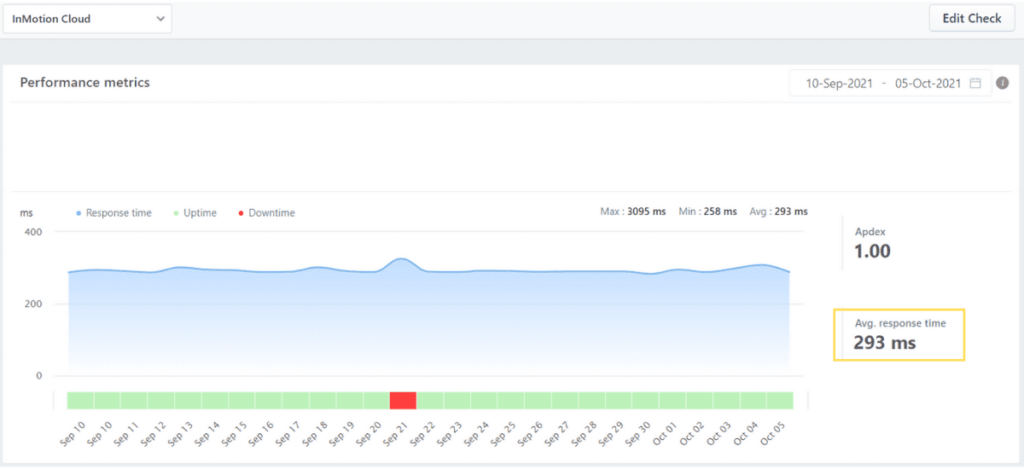
If you want full control over your cloud hosting plan and servers, with plenty of room for scaling up, InMotion Hosting is the way to go.
#5 – DreamCompute — Best for Developers & Virtual Computing
DreamCompute from DreamHost lets you run any Linux OS, including uploading your own custom operating system.
It truly is a blank slate you can turn into whatever you want, which makes it excellent for developers who want to leverage cloud hosting for virtual computing solutions and hosting web apps.
DreamHost delivers quality web hosting, and that quality certainly extends to DreamCompute as well. While you get all the server and backend control you need to build unique solutions on the web, DreamHost delivers fantastic performance.
Provision servers on demand with little effort, run everything on the operating system you prefer, and tap into DreamCompute’s open-source code to tinker and create as much as you’d like. Scale in any direction, whether you want to allocate more resources to one virtual machine or spin up several to handle individual responsibilities and actions.
All the while, you’ll benefit from incredibly fast processing and unfailing uptime.
DreamCompute is perfect for you if you don’t want to feel like you’re on a provider platform at all. The host gets out of your way and lets you dream up whatever you can imagine.
What we really love is how easy it is to tweak and resize instances and their resource allocations.
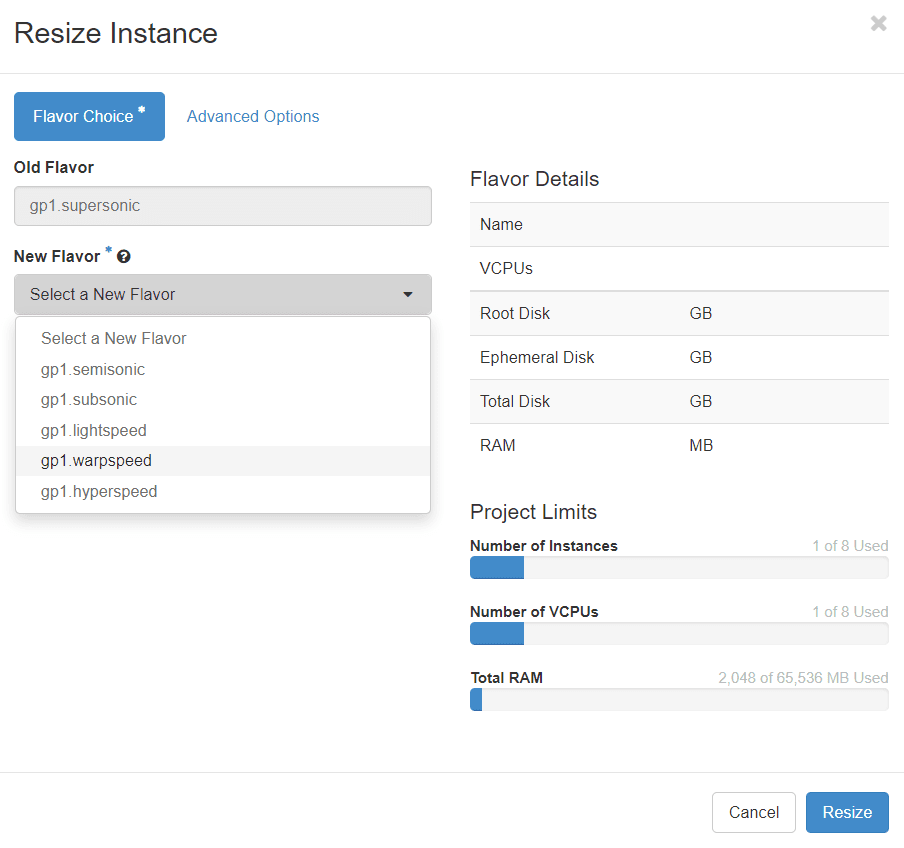
You can easily see your account limits in the window if you decide to resize an instance. You can also see these limits when you add a new instance and on the overview screen of your cloud dashboard:

There are several one-click OS installations available when creating new instances, including Fedora, Debian, and CentOS. You can also upload your own OS, if you’d like to.
Pricing is very reasonable, too, and billed in a flexible way. You basically have a few plans to choose from when starting out on DreamCompute that scale up in terms of memory. The entry-level option gives you 512 MB of memory for a maximum of $4.50 per month, the midrange 2 GB option tops out at $12 per month, and the 8 GB configuration runs $48 per month.
You’re billed based on monthly usage, which can be a huge benefit. If you’re not maxing out the allotted 600 hours of monthly use of DreamCompute, you’ll pay less than the maximum monthly rate for your plan.
If you’re considering an option like DreamCompute, you know what you’re doing in a web hosting backend and you know what you want to accomplish. DreamHost has built this offering to provide you with a hassle-free way to build applications, crunch massive sets of data, and accomplish great feats of virtual computing.
If you’re ready to get your hands dirty and build something incredible, sign up for a DreamCompute plan.
Methodology for Choosing the Best Cloud Web Hosting Plan
Cloud hosting is the best of both worlds when it comes to hosting your website or running a web application. It gives you the power of VPS or dedicated hosting, bolstered by the reliability of a cloud server network.
And, you usually don’t have to handle any of the maintenance unless you choose an unmanaged or virtual computing plan.
Most people are coming to cloud hosting for an upgrade in performance. Let’s dive into the boosts and benefits this upgrade can provide you, as well as how to consider these factors in your purchasing decision.
Delivering the Speed and Uptime You Need
You hate waiting for things, right?
We all have stuff to do and, when you go to a website, you don’t want to watch the page slowly load.
Your visitors don’t either.
Eliminating this issue is usually the number one reason people upgrade from shared hosting to cloud hosting. It keeps your users happy and allows your site to rank higher in search results.
We tested each provider out by building a simple demo site on each host’s platform and then monitoring load times via FreshPing at one-second intervals.
To be honest, all the hosts did quite well in this category, averaging load times of 304 milliseconds as a group.
You can rest assured that cloud hosting delivers on the promise of faster load times. But what about uptime consistency?
Site access reliability was a different story, with a much wider range of performance from the hosts we tested. Some never experienced a moment of downtime, while others had an hour or more of unavailability in our month of testing.
Cloud hosting is meant to lean on a network of servers to eliminate downtime entirely. If one group of servers is down, a quality provider has others connected via the cloud that can pick up the slack and prevent any of the sites hosted on them from being unavailable to visitors.
Granted, many different factors can lead to downtime and it’s hard to get true 100% uptime from any host. And one hour out of an entire month isn’t even half of one percent.
But that one hour of downtime could be crucial to your success if it comes at the wrong moment. That’s why most providers are mindful of this and hold themselves to a 99.9% uptime guarantee.
As a buyer, it’s important to look for such a guarantee when considering which provider is the right one for you. If you can’t afford any downtime, find a host that has an SLA-backed uptime guarantee or at least a money-back guarantee period that allows you to find a better host if your first choice’s performance is lacking in this regard.
How Much Are You Getting For the Price?
We know that if you’re looking into cloud hosting, you know a thing or two about the server resources you’ll need. Not much else really matters if you’re not getting the processing power, memory, and storage to support your site or web app.
But, it’s going to cost you more than shared hosting (usually). So, what represents good value?
We think it’s important to look for providers that are generous enough with their entry-level plans that you get at least 2 GB of RAM and 200 GB of storage space on them. It’s also beneficial if you can host more than one website on it.
What’s great with cloud hosting is that there is a lot of flexibility and scalability. Most providers let you flex resources or instantly scale up to a different plan whenever you find yourself wanting more.
If your site is likely to grow or on the precipice of becoming much more popular, keep that in mind. Easy scalability (that doesn’t require you to waste money paying more than you should for the upgrade) is perhaps more important than the initial resource allocations you get on a plan.
Also, be mindful of the wide range of price points. Something basic that’s meant to serve as an easy path from shared hosting to better performance will have monthly rates that more closely mirror shared hosting plans. In these cases, you should expect solid quality for under $10 per month.
However, if you’re looking to cloud hosting for a solution for web applications, large databases, or a closer approximation of dedicated servers, you’re going to find higher price points across the board.
Can You Get Help When You Need It?
We feel that, even if you’re pretty well-versed in hosting administration and management, you should still be able to find quality help when you need it.
If your server goes down or you need help scaling, there should be real human representatives helping you arrive at a solution.
While the power of cloud hosting is important, it’s not much of an upgrade if it’s too steep of a learning curve compared to your previous hosting arrangement.
There is one major factor here to consider above all others: managed versus unmanaged cloud hosting.
If you opt for a managed hosting plan, you’ll have the provider’s experts monitoring things, handling routine administration, and helping your site run as smoothly as possible. That usually implies also getting access to the full array of customer support options: email, ticket, chat, and phone.
Managed cloud hosting is the ideal route if you’re no web hosting professional. Unmanaged options, on the other hand, provide the user with much more control over their hosting environment at the expense of guided setup and hands-on assistance.
But, neither option should come without some form of support. We assessed each provider in general on what kinds of support options they offer, whether they give you an option for human assistance instead of forcing you to pore over knowledge base articles, and how helpful their reps were when we put them through their paces during our testing.
In the above reviews, we call out any provider that really rose to the occasion or made things harder than they needed to be.
Our hope in covering this in our reviews is to shine a virtual spotlight on problem areas, so you can avoid poor service if that’s something you value highly. You don’t want to be left holding nothing but a squirt gun when you really need your cloud hosting provider to put out a fire one day.
Summary
Cloud hosting encompasses a broad range of potential upgrades from shared hosting. There are cloud hosting options that deliver forms of VPS and dedicated hosting, while other providers offer serious platforms for developers of web apps and other more intricate projects.
Most people just want a solid upgrade in performance from shared hosting and we think Hostinger is the best option for those considering cloud hosting for the first time. It has the perfect blend of ease of use and power at an easy-to-swallow price point.
Our ultimate advice? Take our research into consideration and use our methodology to apply to your own search. We’ve done the work to make sure you have enough information to find the provider that offers you the best value for taking the next step up in web hosting.




